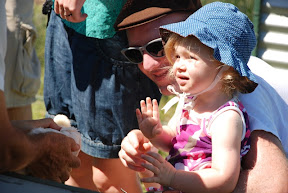 My experience is that there is a growing disconnect between people and the food they consume (I use the word consume because I think eating has connotations which often don’t apply). I have many friends who cannot cook, many more who struggle to determine the difference between healthy and unhealthy options and most people I know don’t have a clue where their food comes from, how it got to them or how it was processed (I could use the word made instead of processed, but again it suggests human intervention which is seldom the case).
My experience is that there is a growing disconnect between people and the food they consume (I use the word consume because I think eating has connotations which often don’t apply). I have many friends who cannot cook, many more who struggle to determine the difference between healthy and unhealthy options and most people I know don’t have a clue where their food comes from, how it got to them or how it was processed (I could use the word made instead of processed, but again it suggests human intervention which is seldom the case).
This trend is concerning to me, and I am not alone. Slow Food is represented in over 130 countries and has more than 100 000 members. The movement started about 20 years ago in Italy.
Slow Food is a non-profit, eco-gastronomic member-supported organization that was founded in 1989 to counteract fast food and fast life, the disappearance of local food traditions and people’s dwindling interest in the food they eat, where it comes from, how it tastes and how our food choices affect the rest of the world. To do that, Slow Food brings together pleasure and responsibility, and makes them inseparable.
The organisation consists of thousands of small convivia (groups) in each area. Each convivia has its own characteristics and focus, but all subscribe to the Slow Food philosophy which is that food should be good, clean and fair. The food we eat should taste good, it should be produced in a clean way that does not harm the environment, animal welfare or our health, and food producers should receive fair compensation for their work.
The mission of Slow Food is three fold: To defend biodiversity, spread taste education and connect producers and consumers. Each convivium approaches this mission in a different way, depending on their resources, members and opportunities. There are several Slow Food convivia in South Africa and Cape Town has a new convivium called Slow Food Mother City. I am on the committee and am very excited about the project.
We are very keen to connect Capetonians with the producers of the area and inform our members about what good, clean and fair foods are available to them. We have had several successful events already and the membership is growing nicely.
Our first event was an interesting pairing of food and artisinal beer at &Union, you can read more about that here and here. Then we visited the biodynamic chicken farm at Spier which was fascinating, read about that here. We have many exciting events lined up, including things like:
– Indigenous lamb tasting and CSA
– Food Film Festival
– Fruit & vegetable preserving workshops
– Fruit Community Supported Agriculture projects
– Wine and biodiversity outings (includes picnic – children welcome)
– Producer showcases
– Wild mushroom forest walk (children welcome)
– Chocolate tasting and demonstration
Events are open to guests, but members get preference as well as a discount on the event cost. One of our goals is to keep event costs as low as possible and to also make as many events kid friendly as possible (for example, the beer pairing and chicken farm visit were both R20 for members and R30 for non members).
The cost of membership is also very reasonable at R70 per year and it includes some other benefits. If you would like to join Slow Food Mother City, please submit your application here.
Our next event (on the 27th March 2010) is a visit to Backsberg Estate which has won several awards for its environmental initiatives (I recently wrote about that here). We will be taken on a walk around the farm to learn about some of their environmental initiatives before doing a wine tasting and then enjoying an al fresco picnic together. The event is child friendly and priced very reasonably. The details of the event are available on the Slow Food Mother City website here.
Related websites:
